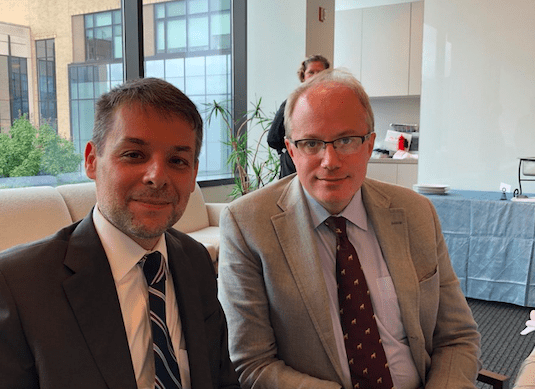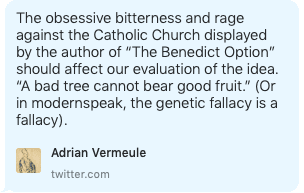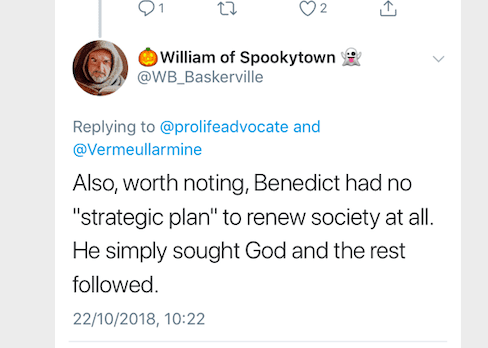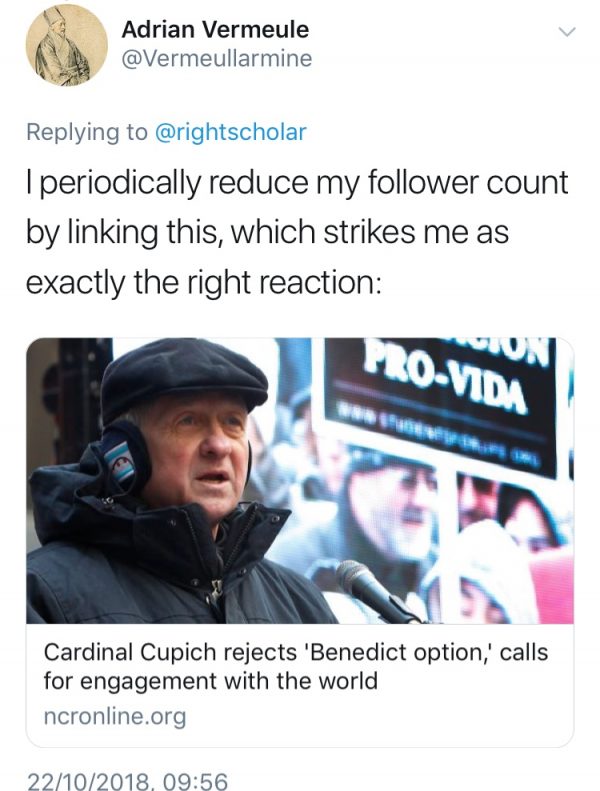Adrian Vermeule’s Ivy League Papstprinzip

He’s blocked me on Twitter, but a friend sent me this tweet from Adrian Cardinal Vermeullarmine, the Catholic convert of two years who has fashioned himself into a Rex Mottram for the Ivy League rightist intellectual set. If the Pope says its raining, but no moisture is falling from the sky, from Adrian’s point of view, it really is raining in a spiritual sense, but we’re too sinful to see it. This is Mottramism.
What’s completely bizarre is that Prof. Vermeule, a Harvard Law school star, positions himself much to the right of the conservative mainstream — but has embraced an intellectual position that requires him to celebrate everything Pope Francis does. How, exactly, does one go from angrily defending Pius IX’s 1858 kidnapping of Edgardo Mortara, the Jewish child who had been secretly baptized by a Catholic servant, and who was removed from his home by agents of the pope, so that he could be raised Catholic. (Here’s a thoughtful recap of the meaning of the affair today, from the Jewish magazine Mosaic.) Because Vermeule blocked me on Twitter, I can’t find and post any of his tweets denouncing First Things magazine for its editor’s apologizing for having published a review essay defending Pius IX’s actions.
Many leading conservative Catholics spoke up to clearly affirm that Pius IX had been wrong to have had the Jewish child kidnapped. But Vermeule — sorry, Cardinal Vermeullarmine, after the Counter Reformation Cardinal Robert Bellarmine — staunchly defended the 19th century pope’s deed. This is what happens when your ideology commits you to defending whatever a pontiff does.
Lately His Eminence has been tearing into Catholics — even traditionalists like Michael Brendan Dougherty — who criticize Pope Francis on traditionalist grounds. They have pointed out that the things Francis is saying and doing radically undermine the Catholic Church’s teaching in various ways, but Vermeule, the patriarch of Ivy Ultramontanism, sees in Francis’s critics an undifferentiated mob of de facto Protestants who must be condemned and combatted. What’s completely weird is that this far-right Harvard Law professor finds himself in total sympathy with Father Thomas Rosica, a progressive who said recently of the pontiff:
Pope Francis breaks Catholic traditions whenever he wants because he is “free from disordered attachments.” Our Church has indeed entered a new phase: with the advent of this first Jesuit pope, it is openly ruled by an individual rather than by the authority of Scripture alone or even its own dictates of tradition plus Scripture.
And if this insane suggestion from a group of fathers working at the Youth Synod in Rome now gets the approval of Pope Francis, Cardinal Vermeullarmine will defend it too with the vigorous loyalty of a pickaxe-wielding Rumanian miner rushing down from the mountains to defend Comrade Ceausescu:
Spanish Group A on the Liturgy #Synod2018 pic.twitter.com/lWTCLsT6iR
— Catholic Sat (@CatholicSat) October 20, 2018
https://platform.twitter.com/widgets.js
Why do I care? Because a reader sent me this Vermeule tweet from this morning:

Think how far gone into the fever swamps of Mottramist ideology you have to be to identify as a product of “obsessive bitterness and rage against the Catholic Church” a book built around a celebration of the wisdom and practice of traditionalist Benedictine Catholic monks, one that highlights at least two orthodox Catholic communities as exemplars for the entire Christian world? Recently in Italy, The Benedict Option was praised in a speech by Archbishop Georg Gänswein, the private secretary of Benedict XVI and prefect of the Papal Household. Monsignor Gänswein ended his remarks like this:
Therefore I have to confess sincerely that I perceive this time of great crisis, one that is evident to everyone, mostly as a time of grace. In the end, we will be “set free” not by a specific effort, but by the “truth”, as the Lord assured us. Within this hope, I look at the recent accounts made by Rod Dreher for the “purification of the memory” requested by John Paul II; and hence, with gratitude, I read his “Benedict Option”, as a marvelous source of inspiration. In these last few weeks, nothing else has provided me as much consolation.
I don’t think I have to worry much about Vermeule’s crackpot diagnosis of my book — which I’m sure he hasn’t read — and my fine self having any influence outside of a tiny group of ideologues, who are equally ignorant of the book I’ve actually written. From that Vermeule thread:

Well, gosh, I say this on page 7 of The Benedict Option:
These monasteries kept faith and learning alive within their walls, evangelized barbarian peoples, and taught them how to pray, to read, to plant crops, and to build things. Over the next few centuries, they prepared the devastated societies of post-Roman Europe for the rebirth of civilization.
It all grew from the mustard seed of faith planted by a faithful young Italian who wanted nothing more than to seek and to serve God in a community of faith constructed to withstand the chaos and decadence all around them.
What I find fascinating about him is how even the finest minds can become possessed by an abstract idea and its logic, to the point of near-insanity. Vermeule’s slavish ultramontanism commits him to defending a modernist pope hammering away at the foundations of Catholic teaching.
A reader emails this screenshot of a subsequent Vermeule tweet this morning:

Of course Cupich had plainly not read the book either, as is obvious from the content of his remarks. Still, it’s fascinating to see Vermeule and his followers lining up with anti-traditional modernists like Cupich.
It would be wrong to think of Vermeule’s crankery as merely eccentric. A clue as to how the right-wing ultramontanist Vermeule joins hands with Rosica and Cardinal Cupich can be found in this short 2017 essay by Vermeule, on the political and religious thought of Carl Schmitt — this, based on a Schmitt book published before Schmitt became a Nazi. Vermeule writes:
Here we arrive at the heart of Schmitt’s vision for the future of the Church and its role in a society increasingly dominated by technical rationality. Schmitt’s prediction is that such a society would eventually consume and destroy itself; and a central thesis of the book as a whole is that our liberal-technical society is itself just such a society.
Schmitt is unfortunately vague on the precise mechanisms of self-destruction. But from the larger context of his thought we can extrapolate to fill in the remainder of the picture. The state becomes overrun by rent-seeking interests and a depoliticized managerial politics, while citizens relapse into a kind of apathetic and hedonistic privacy, dominated by consumerism and a consumerist approach to political life. At a certain point, however, the thinness of the regime’s claim to loyalty, and the accelerating pace and increasing burdens of relentless creative destruction, jointly become intolerable. The sheer plasticity and restless liberationism of the regime exceed the populace’s appetite for freedom, and a kind of rebellion against the principles of the regime itself will occur. The populace craves the return of “strong gods” (in R. R. Reno’s phrase) and summons them. It is not impossible to discern the beginnings of such a process in our own era, as Reno indeed does. The economic-technical state ultimately turns out to be self-undermining, because it rests upon a defective psychology and anthropology.
How then to understand the role of the Church in the setting of a society careening towards this endpoint? My suggestion, which is consistent with Schmitt’s vision, but goes beyond what he articulates, is that the Church serves as a kind of ark, whose vocation is to preserve the living tradition of the Verbum Dei amidst the universal deluge of economic-technical decadence, and the eventual self-undermining of the regime.
There are a number of distinct structures or vehicles that are available to carry out the Church’s vocation as a guardian of memory. One is a museum, a static space for unliving or frozen objects. Another is a zoo, a static space for living beings. Museums and zoos have their place and value, but a third and higher vehicle of guardianship is the ark. Unlike a museum, an ark houses living beings, who breed, reproduce, and change over time. Unlike a zoo, an ark does not remain in place, but carries its beings on a journey with a discernible aim, even if that aim is, for the time being, merely survival.
Hmm. My guess is that Vermeule sees the figure of the Pope, not the Church itself, as the Ark. It’s a crucial difference. Catholic traditionalists like Michael Brendan Dougherty maintain that the Pope is bound by the tradition of which he is a guardian. I’ve not read widely in Vermeule, so please correct me if you have, and I’m wrong, but it seems clear to me that Vermeule believes that the Church is the Pope. If Francis leads the Church away from its authoritative tradition, towards modernist forgetting, well, Cardinal Veullarmine will provide the intellectual rationalization for whatever the Leader says.
How that can be squared with anything in the Catholic tradition, I don’t know. Seems to me that Cardinal Vermeullarmine is adapting for Catholic use the German concept of Führerprinzip, which, note well, slightly predates the Nazi Party. From Wikipedia:
The Führerprinzip was not invented by the Nazis. Hermann von Keyserling, an ethnically German philosopher from Estonia, was the first to use the term. One of Keyserling’s central claims was that certain “gifted individuals” were “born to rule” on the basis of Social Darwinism.
The ideology of the Führerprinzip sees each organization as a hierarchy of leaders, where every leader (Führer, in German) has absolute responsibility in his own area, demands absolute obedience from those below him and answers only to his superiors. This required obedience and loyalty even over concerns of right and wrong.
How does a self-identified orthodox Catholic justify blind deference to the person of the Pope, even when that Pope says and does things that appear to contradict the authoritative teachings, and the traditions, of the Roman Catholic Church?
Papstprinzip, is how.
(No, I’m not calling Vermeule a Nazi. I’m saying that his Schmittian follow-the-leader-at-all-costs Catholicism puts him in the absurd position of defending a Pope who is tearing apart the things that he, Vermeule, professes to value. This is in no way conservative. It’s radical.)
Looks like I owe an apology to Cardinal St. Robert Bellarmine for having associated his name with Pope Francis’s Harvard disciple:
“It is licit to resist a Pontiff who attacks the body, so also is it licit to resist him who attacks souls … or above all, tries to destroy the Church … it is licit to resist him by not doing what he orders and by impeding the execution of his will” – St Robert Bellarmine
— Spixxie Boi (@spixxie_boi) October 22, 2018
https://platform.twitter.com/widgets.js
If any of you are a closer readers of Vermeule than I am, and have a better explanation for where he’s coming from with all this, please speak up. I’m reminded of Catholic blogger Mark Shea’s hopeless Mottramism from 2002-05, when he showed himself incapable of imagining that Pope John Paul II was failing in his handling of the scandal. Shea kept putting forward on his blog a theory that amounted to “John Paul has a secret plan to end the scandal, but we’re too sinful to see it.”
UPDATE: Reader Adamant says my reading of Vermeule is incorrect, and offers this lengthy piece Vermeule once wrote in First Things as evidence for that conclusion. I’m not sure. Certainly I would agree with most of what Vermeule writes here. I believe, though, that the main difference is that he, as a Catholic integralist, sees a future in Catholics steadily marching through the institutions. Leaving aside the fact that non-Catholic Christians, as well as nonbelievers of all kinds, would likely not want to live in a confessional Catholic state, there is no getting around the fact that most Catholics in the modern world would not want to live in that kind of state.
An integralist might say that if they knew what was good for them, they would want to live in a confessional state. Okay. But the Catholic Church in the 21st century, at least in the West, can’t even get most of its own people to agree on more fundamental Catholic teachings than whether or not Catholicism should be the religion of the state. How can you line them up behind the project of Catholic integralism when you can’t even get most Catholics to show up at mass on Sunday? When — see here — two out of three support gay marriage, and slightly more than half support legalized abortion?
The general thrust of the Benedict Option idea is an answer to this 2004 insight from the church historian Robert Louis Wilken:
Nothing is more needful today than the survival of Christian culture, because in recent generations this culture has become dangerously thin. At this moment in the Church’s history in this country (and in the West more generally) it is less urgent to convince the alternative culture in which we live of the truth of Christ than it is for the Church to tell itself its own story and to nurture its own life, the culture of the city of God, the Christian republic. This is not going to happen without a rebirth of moral and spiritual discipline and a resolute effort on the part of Christians to comprehend and to defend the remnants of Christian culture. The unhappy fact is that the society in which we live is no longer neutral about Christianity. The United States would be a much less hospitable environment for the practice of the faith if all the marks of Christian culture were stripped from our public life and Christian behavior were tolerated only in restricted situations.
If Christian culture is to be renewed, habits are more vital than revivals, rituals more edifying than spiritual highs, the creed more penetrating than theological insight, and the celebration of saints’ days more uplifting than the observance of Mother’s Day. There is great wisdom in the maligned phrase ex opere operato, the effect is in the doing. Intention is like a reed blowing in the wind. It is the doing that counts, and if we do something for God, in the doing God does something for us.
The Benedict Option does not call for total Christian withdrawal from public life. It does call for prioritizing both the re-evangelization of Christians and strong discipleship. The day might come when Roman Catholics, or Christians in general, will be called to offer political leadership as confessing Christians. They — we — will not be ready for that call, or worthy of that call, if we do not undergo intensive reform now. Seems to me that the Achilles heel of Vermeule’s concept is its dependence on the stability of the Church of Rome, and the resilience of its moral authority. Again, it’s so bizarre to watch a right-of-center Catholic twist himself into knots to defend Pope Francis, who is using papal authority to undo traditional Catholic teachings for the sake of accommodating liberal modernity. If the Holy Roman Pontiff cannot be relied on to uphold and defend magisterial tradition, where does that leave Catholic integralists? The only way to defend their position is to accept dogmatically that whatever the pope decides to do is right because the pope has decided to do it.
Right? What am I missing?
Subscribe for as little as $5/mo to start commenting on Rod’s blog.